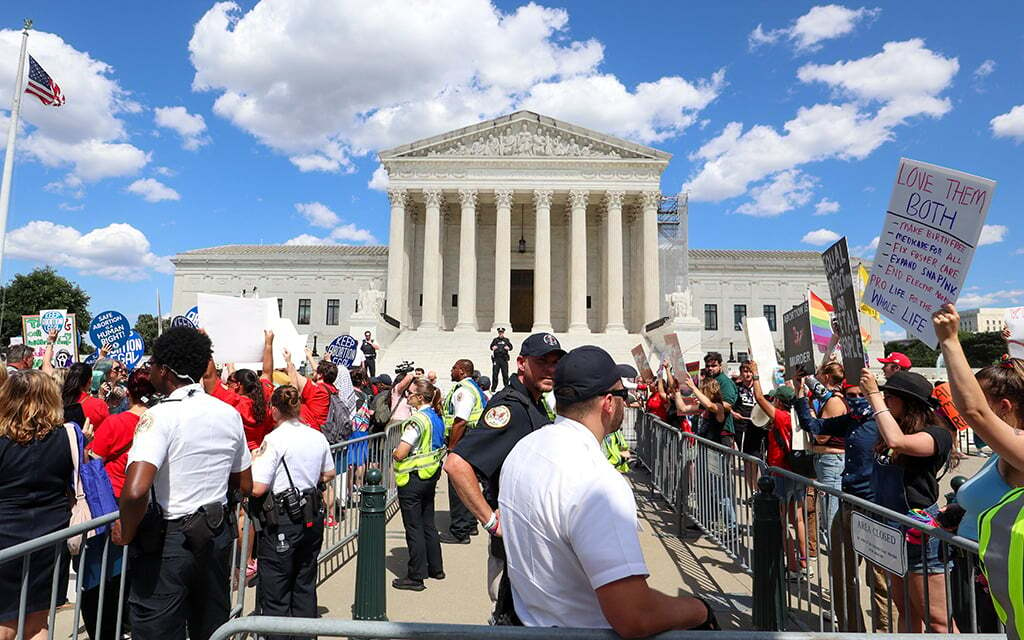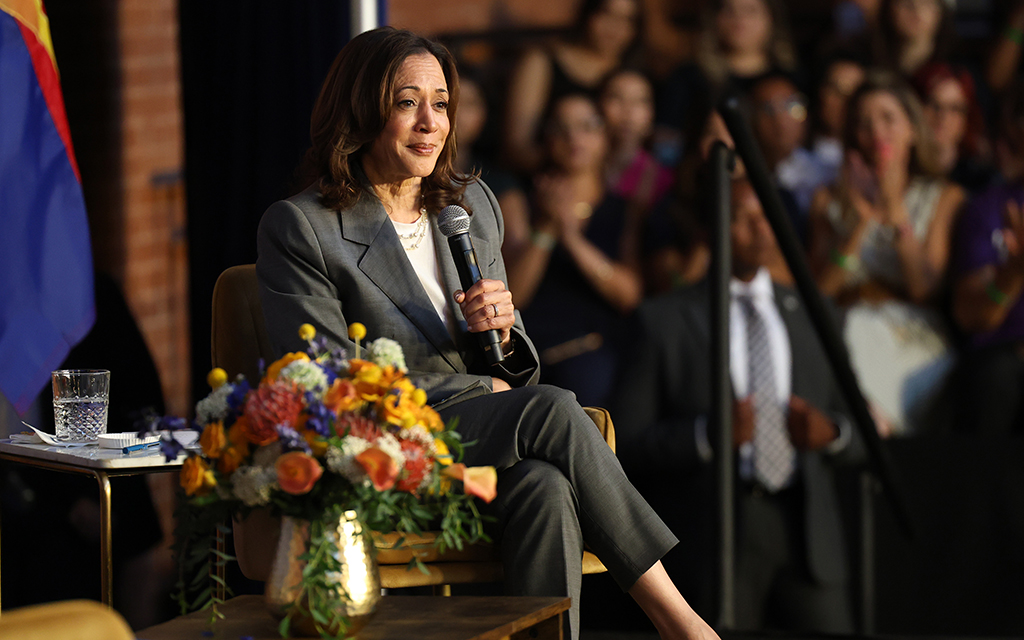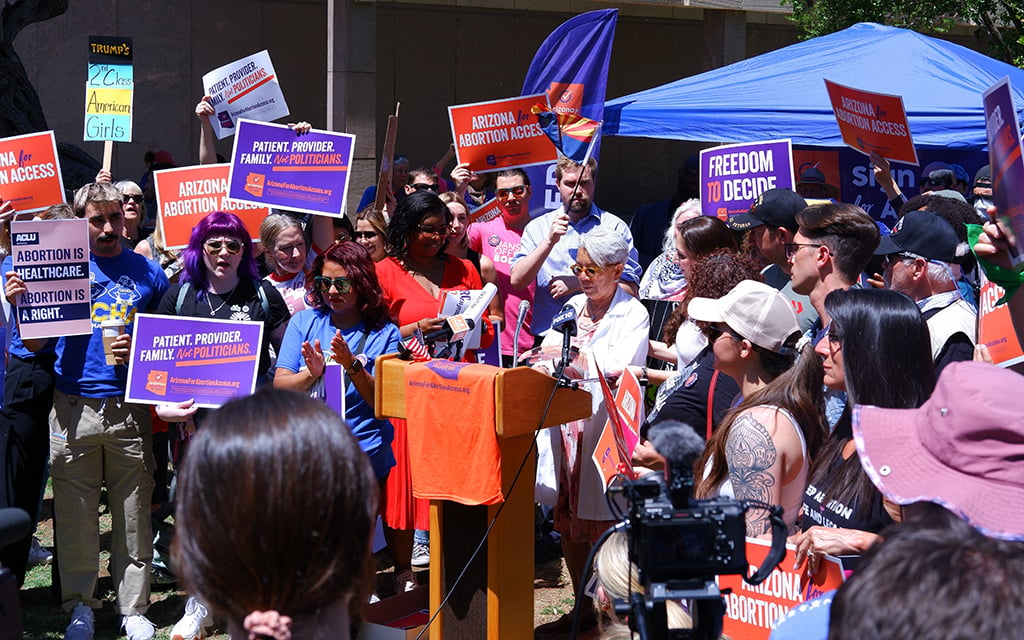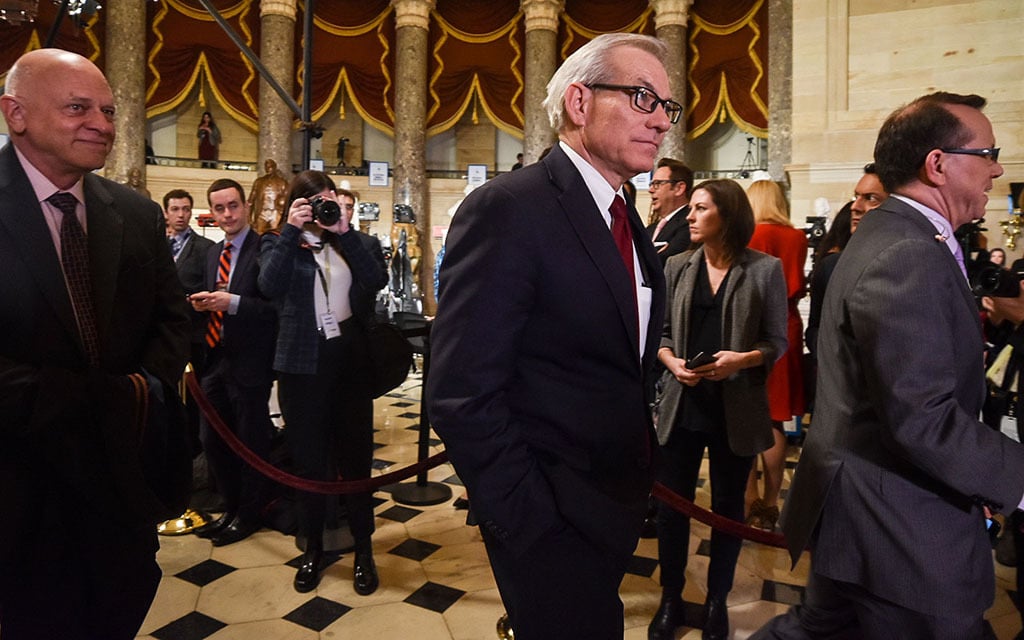WASHINGTON – Democrats are banking on abortion as their saving grace in Arizona, where President Joe Biden won by just 10,000 votes in 2020 and currently lags Donald Trump in their rematch.
Arizona for Abortion Access, a coalition that includes the ACLU and Planned Parenthood, submitted a stack of 800,000 signatures Wednesday morning to get an initiative in front of voters in November.
That’s one in five registered voters.
The measure would protect access to abortion through fetal viability. In the two years since the Supreme Court struck down Roe v. Wade, similar ballot initiatives have bolstered Democrats in red, blue and purple states.
Particularly after Biden’s weak debate performance last week, Arizona Democrats hope the abortion measure will mobilize their voters and boost their chances in crucial presidential and Senate contests that top the ballot.
In a June poll of female Arizona voters from KFF, 60% of Democrats said they’re more likely to vote in November with the abortion measure on the ballot, as would 52% of independents and 37% of Republican women.
The spike is especially sharp among younger voters: 74% of women under 30 told pollsters the ballot measure will draw them to the polls. That’s a cohort that propelled Biden to victory in 2020.
Six states had measures on the ballot in November 2022 to protect abortion access. The measures passed in three of those states, including Michigan – like Arizona, a key presidential battleground.
Michigan voters enshrined a right to abortion into the state constitution as Democrats romped to a victory that defied recent history and most prognostications. Gov. Gretchen Whitmer sailed to reelection with a victory margin of over 10 percentage points. Democrats took control of both houses of the Legislature for the first time in nearly four decades. Turnout rose 4.7% from the previous midterm elections in 2018.
“The abortion ballot initiative changed the electorate in favor of Democrats and made some of the statewide races more about abortion than they otherwise would,” said Matt Grossmann, a political scientist at Michigan State University.
“What we saw is people voting who normally vote only in presidential elections…voted in the midterm election this time because the abortion initiative was on the ballot,” he said.
Whitmer’s GOP challenger Tudor Dixon, a conservative commentator, expressed hard-line stances on abortion. She later rued her refusal to moderate her stance and said it left her wide open to Democratic attacks that resonated with voters.
It’s a mistake Kari Lake appears keen to learn from in Arizona.
The likely GOP nominee for an open U.S. Senate seat, she has called abortion the “ultimate sin.” She expressed support for enforcing an 1864 state law – shelved by the landmark ruling in 1973 protecting abortion rights through viability – after the Supreme Court that struck down Roe v. Wade.
When the state’s highest court ordered the 1864 ban reinstated, Lake backtracked.
“We must have exceptions for rape, incest, and threats to the life of the mother,” she posted on X, adding that a ban without such exceptions “is not where the people are.”
Rep. Ruben Gallego of Phoenix, unopposed for the Democratic nomination for Senate in the July 30 primary, slammed her.
“Politicians like Kari Lake have put this state in danger, put the health of women in danger, for power, and now they’re trying to run away from it,” he told MSNBC at the time.
Gallego has made abortion rights central to his campaign, vowing to eliminate the filibuster to overcome resistance in the Senate to a proposal to codify Roe.
Polling from CBS/YouGov in May showed 65% of voters in Arizona favor a constitutional right to abortion. Gallego holds a narrow lead over Lake, and in some polls they’re tied.

Abortion rights and anti-abortion protesters are separated by barriers at the Supreme Court in Washington, D.C., on June 24, 2024. (File photo by Morgan Kubasko/Cronkite News)
Abortion remains one of Trump’s most vulnerable issues.
Backlash to the Supreme Court’s ruling in Dobbs v. Jackson Women’s Health, the case that dismantled federal protection for abortion access, was widely seen as a key reason Democrats averted disaster in the 2022 general elections.
Instead of the red wave Republicans expected, Democrats held the GOP to small gains in the U.S. House and actually picked up a seat in the Senate. Historically, the president’s party suffers big setbacks in midterms.
Democrats are campaigning relentlessly on the issue in Arizona.
Vice President Kamala Harris stumping in downtown Phoenix last week on the two-year anniversary of Dobbs, blasted Trump for naming three of the justices who overturned Roe.
She urged voters “to understand the connection between this issue and elections.”
Interior Secretary Interior Deb Haaland, Sen. Laphonza Butler, D-Calif., and Arizona Attorney General Kris Mayes have all held events in Arizona in the past months to rally support for abortion rights.
The secretary of state’s office expects to certify Arizona’s ballot measure in the next week. Backers needed exactly 383,923 signatures and delivered more than twice as many.
Five other states will have similar measures on the November ballot to codify abortion rights: Florida, Colorado, Nevada, South Dakota, and Maryland.
Backers in three other states – Nebraska, Montana, and Arkansas – are gathering signatures or awaiting certification.
“Democrats did better in 2022 than they otherwise would have because of the abortion issue,” said Mary Ziegler, a law professor at the University of California at Davis who studies reproductive rights. “It’s definitely going to help.”

Vice President Kamala Harris speaks at a Biden-Harris reproductive freedom campaign event in Phoenix on June 24, 2024, the second anniversary of the overturn of Roe v. Wade. “Our work right now is absolutely directly going to affect the people of Arizona, the people of our country, but will have an impact on people around the world. That’s what’s in our hands right now,” Harris said at the event. (File photo by Stella Subasic/Cronkite News)
The impact of these ballot measures has varied and they are no silver bullet for Democrats.
That baseline may not be as significant as Democrats are hoping for. 2022 saw abortion-related ballot measures in red states like Kansas, Kentucky and Montana.
In three red states in 2022, voters sided with abortion rights while also delivering victories to conservative Republicans.
Kansas and Kentucky struck down ballot measures that would have explicitly denied any state constitutional right to abortion. In Montana, voters rejected a measure that would define a fetus as a person subject to state protection from the point of conception. Ziegler said a similar dynamic could take place in Arizona.
“You could have some independents who don’t like Republicans’ positions on abortion, but who might think ‘I can just vote for this ballot initiative, and that’ll protect abortion rights. And then I can vote for Republicans,’” she said.
In Michigan, young voters and others who are generally disinterested turned out to codify abortion rights. Most, said Grossmann, the Michigan State political scientist, probably would have skipped the election, though presidential contests draw more people to participate.
Biden’s disastrous debate performance could offset any tailwind Democrats get out of the ballot measure.
“I wouldn’t be surprised if Biden is down a few more points in Arizona” since the debate, said Miles Coleman, a political analyst for Sabato’s Crystal Ball. “Maybe instead of being down by two or three, now he’s down by four or five.”


